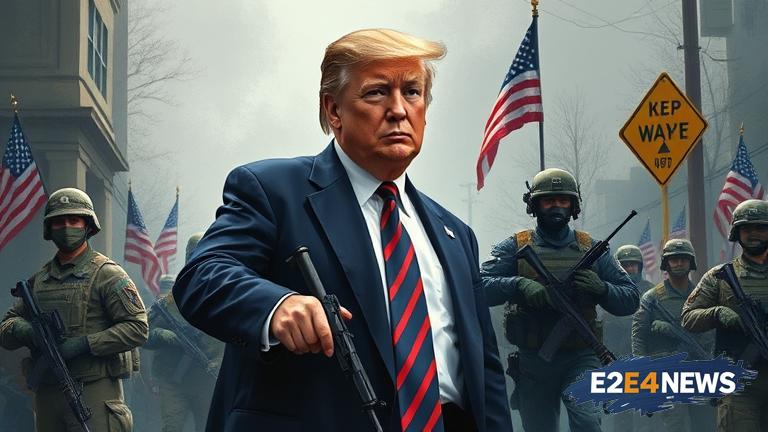In a move that has sparked widespread controversy and debate, President Trump has issued a new order that expands the authority to deploy National Guard troops to cities across the United States. The order, which was announced recently, has been met with criticism from civil liberties groups and lawmakers who argue that it infringes upon the rights of citizens and undermines the role of local law enforcement. According to the order, the National Guard can now be deployed to cities to assist with a range of tasks, including law enforcement, counterterrorism, and disaster response. The move is seen as a significant expansion of the President’s authority, and has raised concerns about the potential for military-style policing in urban areas. The order has also been criticized for its lack of clarity and transparency, with many questioning the specific circumstances under which the National Guard can be deployed. Despite the controversy, the Trump administration has defended the order, arguing that it is necessary to ensure public safety and security. The deployment of National Guard troops to cities is not a new phenomenon, but the latest order has sparked renewed debate about the role of the military in domestic law enforcement. Many have expressed concerns about the potential for the National Guard to be used as a tool for suppressing dissent and protests, particularly in communities of color. The order has also been criticized for its potential impact on civil liberties, including the right to free speech and assembly. In response to the order, several lawmakers have introduced legislation aimed at limiting the President’s authority to deploy the National Guard to cities. The legislation, which has been backed by civil liberties groups, would require the President to obtain congressional approval before deploying the National Guard to cities. The debate over the order has also highlighted the need for greater transparency and accountability in the deployment of National Guard troops to cities. As the controversy continues to unfold, it remains to be seen how the order will be implemented and what impact it will have on communities across the United States. The issue has sparked a national conversation about the role of the military in domestic law enforcement, and the need for clear guidelines and oversight. The Trump administration has argued that the order is necessary to address the growing threat of terrorism and violent crime, but many have questioned the evidence behind this claim. The order has also been criticized for its potential impact on community policing initiatives, which aim to build trust and cooperation between law enforcement and local communities. In recent years, there has been a growing recognition of the need for community-led policing initiatives, and the deployment of National Guard troops to cities has been seen as a step backwards. The controversy over the order has also highlighted the need for greater investment in community development and social programs, which can help to address the root causes of crime and violence. As the debate continues, it is clear that the issue of National Guard deployments to cities will remain a contentious and complex issue, with significant implications for civil liberties, public safety, and community trust. The order has sparked a renewed focus on the need for police reform and accountability, and the importance of building trust and cooperation between law enforcement and local communities. In the coming months, it is likely that the issue will continue to be debated and contested, with significant implications for the future of law enforcement and national security in the United States. The Trump administration has defended the order as a necessary measure to ensure public safety, but many have questioned the evidence behind this claim. The controversy over the order has also highlighted the need for greater transparency and accountability in the deployment of National Guard troops to cities, and the importance of protecting civil liberties and community trust.
